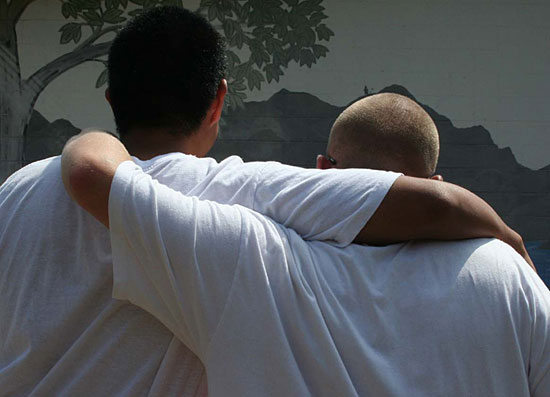Playing through the pain
November 20, 2012
Rival gang members stand face-to-face, struggling to transcend their natural hostility towards one another. But it’s not a real-life showdown. They’re portraying lovers, lead actors in a play they helped write. In fact, it’s just another day in the life for The Unusual Suspects, a nonprofit group that teaches at Camp David Gonzales, a Los Angeles County juvenile detention center.
Sally Fairman, the group’s executive director, says theater arts are an ideal form of expression for the boys, who are incarcerated at the camps for serious crimes. In preparing to confront an audience, students are compelled to confront their own demons.
“Because they are going to be in front of people with their story, they have a big investment,” Fairman says. “They really have to come together if they want to succeed. Every player is important to the show and each of them feels that sense of importance to themselves and to their fellows.”
The educational program consists of two 10-week sessions, each culminating in a live performance. The first session focuses on playwriting. When it’s over, professional actors perform the play under the direction of the young writers, who offer advice on how to portray their characters. The second session centers on performance, using games and improv to teach acting skills. At the end of that session, the students themselves perform the play. The staff and teaching artists are theater pros, and they teach in a hands-on style, about one teacher to every 3 kids.
It’s not always smooth sailing. Many of the kids carry the baggage of physical and sexual abuse, drug and alcohol issues and abandonment problems from absentee parents. A good number of them have gang affiliations, like the two rivals who were playing opposite each other as lovers in true Shakespearean tradition, with one taking the role of a woman. These obstacles must be overcome for a successful play.
Getting beyond such issues is the underlying goal of the program, according to Michal Sela-Amit, a board member of the group who chairs the Families and Children Concentration at USC’s School of Social Work. The camp workshops are intended to function like group therapy sessions, although that’s not how it feels to participants. They’re too busy acting and writing.
“They’re not going to come to therapy that quickly and they’re not going to talk about those things so willingly,” Sela-Amit says of the workshops. “Drama works on so many levels—with the individual, the group, the audience—you’re having fun with a group of people.”
Sela-Amit says the program is intended to maximize a person’s full brain power. She says that traumatic experiences, such as those experienced by the young adults in the camps, settle into the brain’s more creative right side, where they inhibit learning and growth and create worries and anxieties. The exercises of writing and acting, she says, essentially push these traumas to the brain’s more logical left side, where they can be processed. Once that happens, new neural connections can form, enhancing an individual’s ability to interact with society in a more positive way.
Mike Varela, director of Camp Gonzales for the county’s Probation Department, says he can see the results as tough guys at his camp break out of the hard shells they’ve built up over the years.
“You have these hard guys with these façades, and suddenly they are laughing and having the time of their life,” he says.
This Saturday, November 10 at 1 p.m., professional actors will perform the students’ latest composition—Money, Power, & Regret—for a public audience at Camp Gonzales. (For security reasons, advance reservations are required for those who want to attend. While the official deadline for reservations has just passed, staff from the Unusual Suspects said they will try to accommodate late requests. For more information, email [email protected].)
The Unusual Suspects was founded in 1993 by actress Laura Leigh Hughes in response to the Los Angeles riots of the previous year. The group first came to Camp Gonzales in 2004. Over the years, the group has taught thousands of youths, now averaging about 300 per year across the region.
The organization reaches beyond detention facilities, too, to kids ages 9 to 21, who live in high-crime, impoverished and underserved areas. Fairman says the program is always evolving, and they’ve recently started engaging multi-generational groups in south L.A. and Pacoima, with positive results. Older members of the communities are getting involved after seeing their own lives reflected in the performances, she says.
Fairman wants to keep adding The Unusual Suspects’ brand of therapeutic theater to the existing mix of tools and organizations in local communities. So far, she says, communities have embraced the program and offered their own suggestions, such as incorporating visual arts, dance and cultural traditions.
“I would like to see us be a model, expand nationally,” says Executive Director Fairman, “and help more communities place arts at the center of their strategies for transformation.”

Actors Marcus Woodswelch and Hilary Ward portray characters in "The Lost Son," a play written by Camp Gonzales students in 2011.
Posted 11/8/12













 405 bridge work causes a stink
405 bridge work causes a stink
